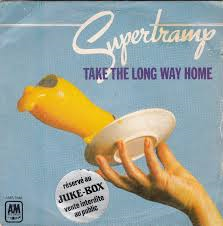 On 5 January 1980, “Take the Long Way Home” by Supertramp was at #26, its highest position in the 80s. Its peak position was #10 in 1979.
On 5 January 1980, “Take the Long Way Home” by Supertramp was at #26, its highest position in the 80s. Its peak position was #10 in 1979.
Youtube does not have a video of “Take the Long Way Home” by Supertramp. I assume this is for copyright purposes, but I still think it’s a crime — and a serious one — because this song is one of the absolute best of the waning days of 1979. So, here are the lyrics; I think posting them is fair use, because I’m going to talk about them at length. Anyway, you should go download the song at Amazon.com, because you need to hear this song if you aren’t familiar with it, and if you are familiar with it and don’t have a copy of it, you need to rectify that situation, pronto.
So you think you’re a Romeo
Playing a part in a picture show
Take the long way home
Take the long way home‘Cos you’re the joke of the neighborhood
Why should you care if you’re feeling good?
Take the long way home
Take the long way homeBut there are times that you feel you’re part of the scenery
Oh, all the greenery is comin’ down, boy
And then your wife seems to think you’re part of the furniture
Oh, it’s peculiar, she used to be so niceWhen lonely days turn to lonely nights
You take a trip to the city lights
And take the long way home
Take the long way homeYou never see what you want to see
Forever playing to the gallery
You take the long way home
Take the long way homeAnd when you’re up on the stage, it’s so unbelievable
Oh, unforgettable, how they adore you
But then your wife seems to think you’re losing your sanity
Oh, calamity, is there no way out?
Oh, yeahDoes it feel that your life’s become a catastrophe?
Oh, it has to be for you to grow, boy
And when you look through the years
And see what you could have been
Oh, what might have been
If you’d had more timeSo, when the day comes to settle down
Who’s to blame if you’re not around?
You took the long way home
You took the long way home
You took the long way home
(Tu, ru, ru, yea)
You took the long way homeYou took the long way home
(Oh yeah)
You took the long way home
You took the long way home
(Ooo yeah)
You took the long way home
I suppose it takes a performer to write a song about the shallowness of the lifestyle of a performer, and for some reason, the 70s seemed to be full of the angst of performers feeling shallow inside. Everyone from Kate Bush (“Wow“) to Frank Zappa (200 Motels) were writing about it around the same time, and off the top of my head, I can’t think of many examples from the following decade.
Regardless, I don’t know that anyone did it as heartrendingly (or popularly) as Supertramp did in “Take the Long Way Home”. Lyrics like “you’re the joke of the neighborhood, Why should you care if you’re feeling good?” cut through the fat that sentimentality lards onto actors and musicians whose job it is to entertain others. We, as listeners, delude ourselves into thinking that someone who can make others feel such profound emotions — elation, humor, depression, wrath — must have no emotions himself, or at least is in full command of them. Perhaps this delusion extends to the performers themselves — this song paints one performer who is so deluded, thinking that a person who can make others laugh, forever playing to the gallery, can’t possibly be sad and needn’t play to himself. I don’t think anyone’s surprised to learn of a psychiatrist who is himself deeply mentally disturbed; why should we imagine that a person whose job it is to delve into others’ emotions can’t have emotional problems, when we freely believe that someone whose job it is to delve into people’s psychological problems can have his own psychological problems?
I don’t want to suggest that all performers are basket-cases waiting to melt down. Obviously that’s not the case. And really, this song doesn’t need to be about actors and musicians; they’re just the most visible when their lives melt down, when they’re trying to convince us and themselves that they’re winning, when in reality, they’re trying to forestall their personal implosion with whatever it is they fuel it with. The silent melting down are all around us, and sometimes it’s hard to see them, because they’ve become part of the scenery, but they’re there. And when the rest of us have settled down, they won’t be around. They took the long way home, and for their sakes, one can hope they’re still on their way.

